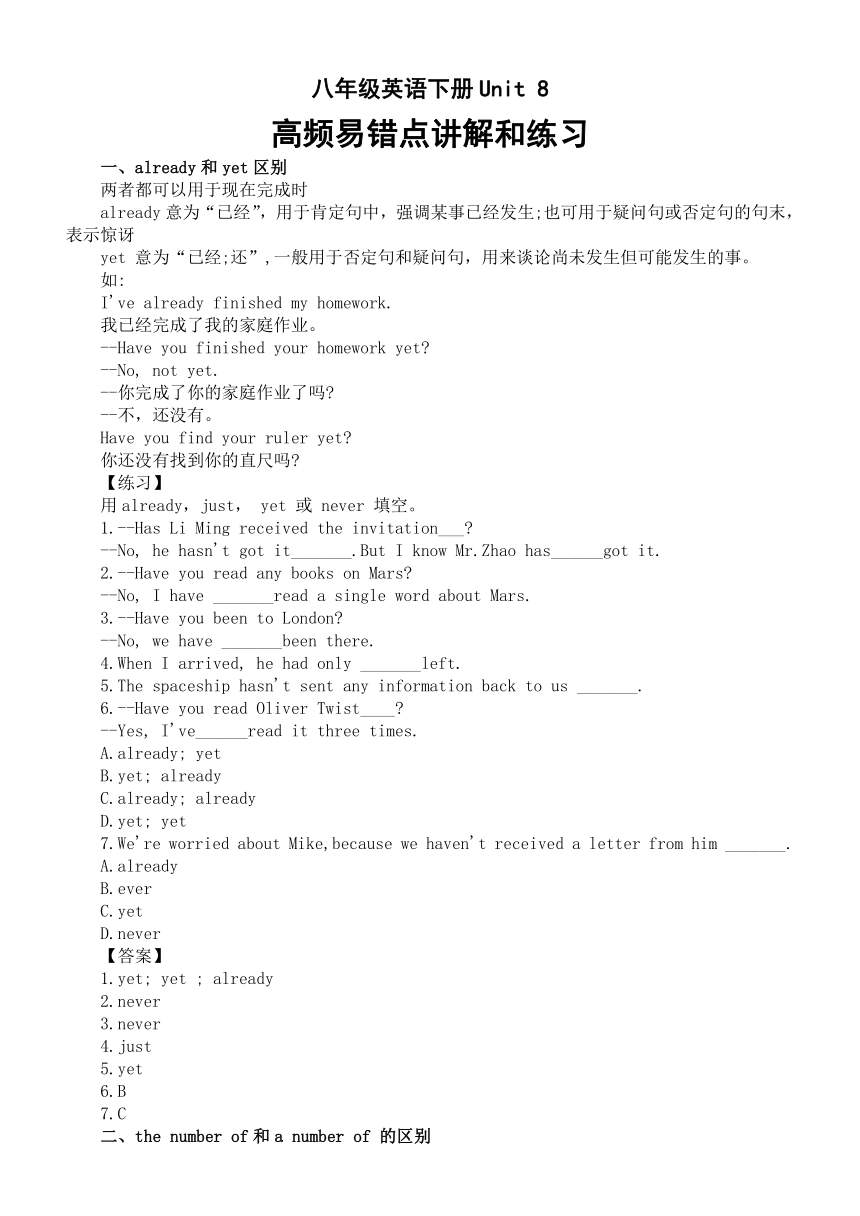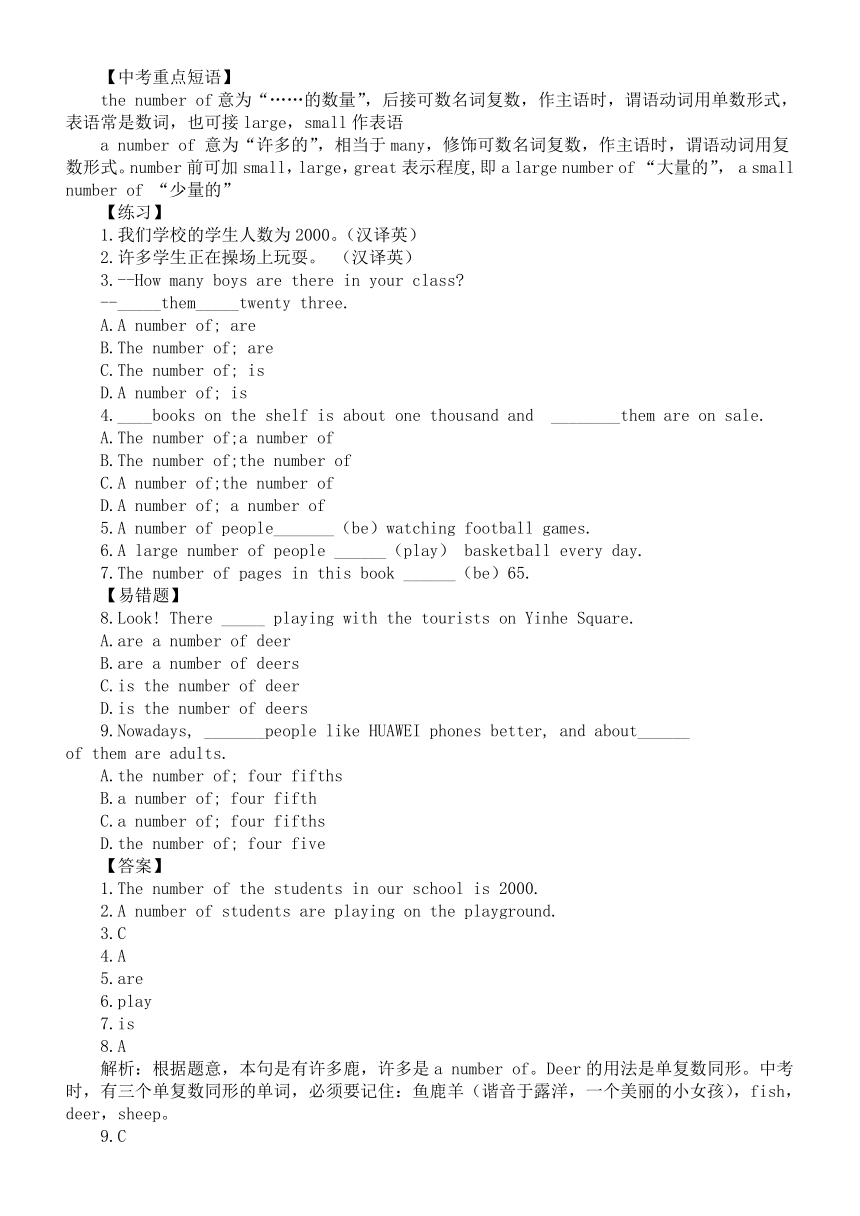Unit 8 Have you read Treasure Island yet高频易错点讲解和练习(含答案)人教版八年级英语下册
文档属性
| 名称 | Unit 8 Have you read Treasure Island yet高频易错点讲解和练习(含答案)人教版八年级英语下册 |  | |
| 格式 | docx | ||
| 文件大小 | 44.1KB | ||
| 资源类型 | 教案 | ||
| 版本资源 | 人教新目标(Go for it)版 | ||
| 科目 | 英语 | ||
| 更新时间 | 2024-05-20 14:55:01 | ||
图片预览


文档简介
八年级英语下册Unit 8
高频易错点讲解和练习
一、already和yet区别
两者都可以用于现在完成时
already意为“已经”,用于肯定句中,强调某事已经发生;也可用于疑问句或否定句的句末,表示惊讶
yet 意为“已经;还”,一般用于否定句和疑问句,用来谈论尚未发生但可能发生的事。
如:
I've already finished my homework.
我已经完成了我的家庭作业。
--Have you finished your homework yet
--No, not yet.
--你完成了你的家庭作业了吗
--不,还没有。
Have you find your ruler yet
你还没有找到你的直尺吗
【练习】
用already,just, yet 或 never 填空。
1.--Has Li Ming received the invitation___
--No, he hasn't got it_______.But I know Mr.Zhao has______got it.
2.--Have you read any books on Mars
--No, I have _______read a single word about Mars.
3.--Have you been to London
--No, we have _______been there.
4.When I arrived, he had only _______left.
5.The spaceship hasn't sent any information back to us _______.
6.--Have you read Oliver Twist____
--Yes, I've______read it three times.
A.already; yet
B.yet; already
C.already; already
D.yet; yet
7.We're worried about Mike,because we haven't received a letter from him _______.
A.already
B.ever
C.yet
D.never
【答案】
1.yet; yet ; already
2.never
3.never
4.just
5.yet
6.B
7.C
二、the number of和a number of 的区别
【中考重点短语】
the number of意为“……的数量”,后接可数名词复数,作主语时,谓语动词用单数形式,表语常是数词,也可接large,small作表语
a number of 意为“许多的”,相当于many,修饰可数名词复数,作主语时,谓语动词用复数形式。number前可加small,large,great表示程度,即a large number of “大量的”, a small number of “少量的”
【练习】
1.我们学校的学生人数为2000。(汉译英)
2.许多学生正在操场上玩耍。 (汉译英)
3.--How many boys are there in your class
--_____them_____twenty three.
A.A number of; are
B.The number of; are
C.The number of; is
D.A number of; is
4.____books on the shelf is about one thousand and ________them are on sale.
A.The number of;a number of
B.The number of;the number of
C.A number of;the number of
D.A number of; a number of
5.A number of people_______(be)watching football games.
6.A large number of people ______(play) basketball every day.
7.The number of pages in this book ______(be)65.
【易错题】
8.Look! There _____ playing with the tourists on Yinhe Square.
A.are a number of deer
B.are a number of deers
C.is the number of deer
D.is the number of deers
9.Nowadays, _______people like HUAWEI phones better, and about______ of them are adults.
A.the number of; four fifths
B.a number of; four fifth
C.a number of; four fifths
D.the number of; four five
【答案】
1.The number of the students in our school is 2000.
2.A number of students are playing on the playground.
3.C
4.A
5.are
6.play
7.is
8.A
解析:根据题意,本句是有许多鹿,许多是a number of。Deer的用法是单复数同形。中考时,有三个单复数同形的单词,必须要记住:鱼鹿羊(谐音于露洋,一个美丽的小女孩),fish,deer,sheep。
9.C
解析:第一空,句子里的动词是like,是原形,不是三单,因此用a number of。如果是the number of,谓语动词一般来说都应该是is,rises,increases这类词汇。第二空就是分数的用法:子基母序的规则,也可以把fifth看成五分之一,那么五分之四就是四个五分之一。因此fifth用复数。
三、look like, be like和feel like 的区别
like最常用作【v.】和【prep】
①作动词,“喜欢”
②作介词,“像”,“类似”,“...怎么样”
注意下面两个高频表达:
How do you like your teacher
= What do you think of your teacher
你认为你的老师怎么样
What is the weather like in Chongqing
= How is the weather in Chongqing
重庆的天气怎么样
短语辨析:
look like “看上去像”,指外观上像。
be like “像……一样”,指品德、相貌等,更多侧重表示人的个性特征。
feel like意为“想要(做某事)”,feel like doing sth.=want to do sth., 其后接名词或动名词,不能接不定式。
feel like 还表示 “摸起来好像”, 因为feel是系动词, 表示“摸起来”,“感觉到”
如:
She looks like her mother.
她看起来像她妈妈。
--What is he like 他是个什么样的人
--He is kind and warm-hearted.他善良又热心。
I feel like a cup of tea.
我想喝杯茶。
Do you feel like joining us
你想要加入我们吗?
I like this scarf.It feels like silk.
喜欢这条围巾。 它摸起来像丝绸。
四、think相关短语
think about 意为“想,考虑”,指考虑解决某一问题,“考虑”的宾语可由名词、代词、动名词、疑问词引导的不定式或宾语从句充当。
think of 意为“思考,想起,考虑”。表示“考虑”的含义时,可与think about互换,后接名词、代词、v.-ing形式或疑问词引导的从句。
think over 意为“仔细考虑”,其中over为副词,如宾语为名词,位于over前后均可,如果是代词,必须置于think与over 之间。
【练习】
1.我正在考虑一个问题。(汉译英)
2.He always thinks of others more than himself.(英译汉)
3.在你做这件事之前,你最好先好好考虑一下。(汉译英)
4.This is my idea.I hope you can _______ it.
A.Think of
B.Think over
C.Think about
D.Think up
5.选词填空:think of,think about 和 think over
①--What do you ______our school
--It's very good.It is clean and beautiful.
②.--Would you like to go abroad to study
--Let me_____it_.
【答案】
1.I'm thinking about a problem.
2.他总是为别人考虑得多,为自己考虑得少。
3.You'd better think it over before you do it.
4.C
5.①think of
②think; over
五、leave相关短语
leave “离开,出发”,其后接表示地点的名词,构成“leave+地点名词”短语。
leave for 后接表示地点名词表示“动身去某地”。
leave...for...表示“离开某地去另一地”, 即leave A for B。
leave from “从……离开”,from后的地点是离开的地方。
如:
When did you leave London
你们是什么时候离开伦敦的
We are leaving for Rome next week.
我们下周将要去罗马。
We will leave Beijing for Shanghai.
我们将要离开北京去上海。
I'm leaving from school.
我要从学校离开。
【练习】
1.My father _______ the city of New York three days ago.
A.leave
B.left to
C.left off
D.left for
用leave和leave for 的适当形式填空。
2.Remember to close the door when you ______ the house.
3.He______ Beijing this morning, and will arrive there in an hour.
【易错题】
4.My father ______ the USA in two weeks.
A.is leave for
B.leaves
C.is leaving for
D.left for
【答案】
1.D
2.leave
3.left for
4.C
解析: 根据时间状语in two weeks“两周后”, 可知是将来时态,动作还没有发生。 选项A, 形式错误; 选项B, 一般现在时; 选项C, 现在进行时, 注意,现在进行时可以表将来; 选项D, 一般过去时。 故选C。
补充leave其他短语:
leave for 离开前往
leave out 删去,遗漏
leave behind 遗留,忘记拿走
leave to 留给,遗嘱赠予
leave over 遗留,剩下,延期
【练习】
1.“Whose name has been______ ”demanded the teacher.
2.When he died,he____ all his property ____his niece.
3.He suddenly realized that he had______his umbrella______.
4.I said goodbye to my best friend John, he would_____ London the next day.
5.Those are questions____by history.
【答案】
1.left out
2.left; to
3.left;behind
4.leave for
5.left over
高频易错点讲解和练习
一、already和yet区别
两者都可以用于现在完成时
already意为“已经”,用于肯定句中,强调某事已经发生;也可用于疑问句或否定句的句末,表示惊讶
yet 意为“已经;还”,一般用于否定句和疑问句,用来谈论尚未发生但可能发生的事。
如:
I've already finished my homework.
我已经完成了我的家庭作业。
--Have you finished your homework yet
--No, not yet.
--你完成了你的家庭作业了吗
--不,还没有。
Have you find your ruler yet
你还没有找到你的直尺吗
【练习】
用already,just, yet 或 never 填空。
1.--Has Li Ming received the invitation___
--No, he hasn't got it_______.But I know Mr.Zhao has______got it.
2.--Have you read any books on Mars
--No, I have _______read a single word about Mars.
3.--Have you been to London
--No, we have _______been there.
4.When I arrived, he had only _______left.
5.The spaceship hasn't sent any information back to us _______.
6.--Have you read Oliver Twist____
--Yes, I've______read it three times.
A.already; yet
B.yet; already
C.already; already
D.yet; yet
7.We're worried about Mike,because we haven't received a letter from him _______.
A.already
B.ever
C.yet
D.never
【答案】
1.yet; yet ; already
2.never
3.never
4.just
5.yet
6.B
7.C
二、the number of和a number of 的区别
【中考重点短语】
the number of意为“……的数量”,后接可数名词复数,作主语时,谓语动词用单数形式,表语常是数词,也可接large,small作表语
a number of 意为“许多的”,相当于many,修饰可数名词复数,作主语时,谓语动词用复数形式。number前可加small,large,great表示程度,即a large number of “大量的”, a small number of “少量的”
【练习】
1.我们学校的学生人数为2000。(汉译英)
2.许多学生正在操场上玩耍。 (汉译英)
3.--How many boys are there in your class
--_____them_____twenty three.
A.A number of; are
B.The number of; are
C.The number of; is
D.A number of; is
4.____books on the shelf is about one thousand and ________them are on sale.
A.The number of;a number of
B.The number of;the number of
C.A number of;the number of
D.A number of; a number of
5.A number of people_______(be)watching football games.
6.A large number of people ______(play) basketball every day.
7.The number of pages in this book ______(be)65.
【易错题】
8.Look! There _____ playing with the tourists on Yinhe Square.
A.are a number of deer
B.are a number of deers
C.is the number of deer
D.is the number of deers
9.Nowadays, _______people like HUAWEI phones better, and about______ of them are adults.
A.the number of; four fifths
B.a number of; four fifth
C.a number of; four fifths
D.the number of; four five
【答案】
1.The number of the students in our school is 2000.
2.A number of students are playing on the playground.
3.C
4.A
5.are
6.play
7.is
8.A
解析:根据题意,本句是有许多鹿,许多是a number of。Deer的用法是单复数同形。中考时,有三个单复数同形的单词,必须要记住:鱼鹿羊(谐音于露洋,一个美丽的小女孩),fish,deer,sheep。
9.C
解析:第一空,句子里的动词是like,是原形,不是三单,因此用a number of。如果是the number of,谓语动词一般来说都应该是is,rises,increases这类词汇。第二空就是分数的用法:子基母序的规则,也可以把fifth看成五分之一,那么五分之四就是四个五分之一。因此fifth用复数。
三、look like, be like和feel like 的区别
like最常用作【v.】和【prep】
①作动词,“喜欢”
②作介词,“像”,“类似”,“...怎么样”
注意下面两个高频表达:
How do you like your teacher
= What do you think of your teacher
你认为你的老师怎么样
What is the weather like in Chongqing
= How is the weather in Chongqing
重庆的天气怎么样
短语辨析:
look like “看上去像”,指外观上像。
be like “像……一样”,指品德、相貌等,更多侧重表示人的个性特征。
feel like意为“想要(做某事)”,feel like doing sth.=want to do sth., 其后接名词或动名词,不能接不定式。
feel like 还表示 “摸起来好像”, 因为feel是系动词, 表示“摸起来”,“感觉到”
如:
She looks like her mother.
她看起来像她妈妈。
--What is he like 他是个什么样的人
--He is kind and warm-hearted.他善良又热心。
I feel like a cup of tea.
我想喝杯茶。
Do you feel like joining us
你想要加入我们吗?
I like this scarf.It feels like silk.
喜欢这条围巾。 它摸起来像丝绸。
四、think相关短语
think about 意为“想,考虑”,指考虑解决某一问题,“考虑”的宾语可由名词、代词、动名词、疑问词引导的不定式或宾语从句充当。
think of 意为“思考,想起,考虑”。表示“考虑”的含义时,可与think about互换,后接名词、代词、v.-ing形式或疑问词引导的从句。
think over 意为“仔细考虑”,其中over为副词,如宾语为名词,位于over前后均可,如果是代词,必须置于think与over 之间。
【练习】
1.我正在考虑一个问题。(汉译英)
2.He always thinks of others more than himself.(英译汉)
3.在你做这件事之前,你最好先好好考虑一下。(汉译英)
4.This is my idea.I hope you can _______ it.
A.Think of
B.Think over
C.Think about
D.Think up
5.选词填空:think of,think about 和 think over
①--What do you ______our school
--It's very good.It is clean and beautiful.
②.--Would you like to go abroad to study
--Let me_____it_.
【答案】
1.I'm thinking about a problem.
2.他总是为别人考虑得多,为自己考虑得少。
3.You'd better think it over before you do it.
4.C
5.①think of
②think; over
五、leave相关短语
leave “离开,出发”,其后接表示地点的名词,构成“leave+地点名词”短语。
leave for 后接表示地点名词表示“动身去某地”。
leave...for...表示“离开某地去另一地”, 即leave A for B。
leave from “从……离开”,from后的地点是离开的地方。
如:
When did you leave London
你们是什么时候离开伦敦的
We are leaving for Rome next week.
我们下周将要去罗马。
We will leave Beijing for Shanghai.
我们将要离开北京去上海。
I'm leaving from school.
我要从学校离开。
【练习】
1.My father _______ the city of New York three days ago.
A.leave
B.left to
C.left off
D.left for
用leave和leave for 的适当形式填空。
2.Remember to close the door when you ______ the house.
3.He______ Beijing this morning, and will arrive there in an hour.
【易错题】
4.My father ______ the USA in two weeks.
A.is leave for
B.leaves
C.is leaving for
D.left for
【答案】
1.D
2.leave
3.left for
4.C
解析: 根据时间状语in two weeks“两周后”, 可知是将来时态,动作还没有发生。 选项A, 形式错误; 选项B, 一般现在时; 选项C, 现在进行时, 注意,现在进行时可以表将来; 选项D, 一般过去时。 故选C。
补充leave其他短语:
leave for 离开前往
leave out 删去,遗漏
leave behind 遗留,忘记拿走
leave to 留给,遗嘱赠予
leave over 遗留,剩下,延期
【练习】
1.“Whose name has been______ ”demanded the teacher.
2.When he died,he____ all his property ____his niece.
3.He suddenly realized that he had______his umbrella______.
4.I said goodbye to my best friend John, he would_____ London the next day.
5.Those are questions____by history.
【答案】
1.left out
2.left; to
3.left;behind
4.leave for
5.left over
同课章节目录
- Unit 1 What's the matter?
- Section A
- Section B
- Unit 2 I'll help to clean up the city parks.
- Section A
- Section B
- Unit 3 Could you please clean your room?
- Section A
- Section B
- Unit 4 Why don't you talk to your parents?
- Section A
- Section B
- Unit 5 What were you doing when the rainstorm came
- Section A
- Section B
- Review of Units 1-5
- Unit 6 An old man tried to move the mountains.
- Section A
- Section B
- Unit 7 What's the highest mountain in the world?
- Section A
- Section B
- Unit 8 Have you read Treasure Island yet?
- Section A
- Section B
- Unit 9 Have you ever been to a museum?
- Section A
- Section B
- Unit 10 I've had this bike for three years.
- Section A
- Section B
